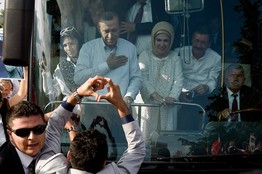Turkish Prime Minister Recep Tayyip Erdogan rallied his supporters on Sunday in a string of defiant speeches designed to showcase his popularity and quell two weeks of unrest, as tens of thousands of antigovernment demonstrators massed in Istanbul’s central Taksim Square.
 Sunday’s competing rallies across the country highlight the widening schism in Turkey’s society after the government’s heavy-handed response to a small environmental demonstration to save a central Istanbul park mushroomed into broad-based antigovernment protests that have left four people dead and close to 5,000 injured.
Sunday’s competing rallies across the country highlight the widening schism in Turkey’s society after the government’s heavy-handed response to a small environmental demonstration to save a central Istanbul park mushroomed into broad-based antigovernment protests that have left four people dead and close to 5,000 injured.
Facing the biggest opposition to his rule since coming to power a decade ago, Mr. Erdogan hunkered down with senior officials from his ruling Justice and Development Party on Saturday in Istanbul before traveling on Sunday to the capital Ankara, detouring via southern Turkey to deliver six speeches in three cities that effectively kicked off the party’s campaign for the local elections in March 2014.
“We are held accountable by the nation, not by some marginal groups. The place for accountability to the nation is the ballot box; the people have brought us in and they can take us out. At this point, other than the nation, no one has the power to remove us,” said Mr. Erdogan, who had climbed atop a bus, striking a defiant tone in Ankara, as tens of thousands in Istanbul chanted for him to resign. “Instead of burning and tearing down places, be patient for seven months. I’ll see you at the polls in seven months.”
Enlarge Image
Associated Press
Turkish Prime Minister Recep Tayyip Erdogan, with hand on heart, and his wife, Emine, acknowledge supporters after arriving in Ankara Sunday.
Mr. Erdogan’s combative stance against the protesters is also at odds with key allies led by the U.S. and the European Union, both of which have repeatedly called for investigations into the use of excessive force by the police and have pleaded the premier to calm tensions by listening to demonstrators’ demands. “The continuing tensions underline the need for restraint on all sides and the importance of finding a quick solution based on dialogue, mutual respect, understanding and inclusiveness,” the EU’s foreign policy chief, Catherine Ashton, said on Sunday.
“Open and sustained engagement of the authorities is essential to reinforcing democracy, building confidence and avoiding escalation,” she added.
The prime minister’s push is designed to turn next year’s poll, the first since the general elections in 2011, into a referendum on his government, seeking to capitalize on the weakness of an established political opposition that has failed to profit from the rising dissatisfaction with Mr. Erdogan, analysts said.
That weakness in comparison to the Justice and Development Party may be an increasingly important factor in the politics of Turkey’s protests, as Mr. Erdogan seeks to his reinvigorate his mandate through the ballot box.
“He is reinforcing his base and telling them that he won’t be pushed around. The organized opposition is also weak and can’t get their act together, and it will take them a while to adjust themselves so we can see why this strategy is being imposed,” said Soli Ozel, professor of International Relations at Kadir Has University in Istanbul. “We now have a standoff and things are not quiet in Istanbul for now, but we don’t know how long that will last.”
Buoyed by three straight election victories, in 2002, 2007 and 2011, his party each time taking a rising share of the vote, Mr. Erdogan has elbowed political rivals aside and left the opposition parties flailing.
Domestically, he has built strong loyalty among Turkey’s religious conservatives, a majority of the electorate, who were long marginalized by the country’s military-backed secular elite.
In the 2011 poll, Mr. Erdogan won 50% of the vote, leaving the main opposition Republican People’s Party trailing with 26% and the Nationalist Movement Party with 13%.
Galvanizing the divergent, and in some cases competing, political interests of the protesters to challenge Mr. Erdogan in mainstream politics is likely to prove very difficult.
Many demonstrators agree on little beyond two key viewpoints: a common perception of Mr. Erdogan’s ruling style as autocratic and a rejection of a string of government policies seen to be encroaching on personal freedoms.
Fault lines were evident in the coalition against Mr. Erdogan at Taksim Square on Sunday, where disparate groups including socialists and communists, along with Turkish and Kurdish nationalists, secularists, environmentalists, gay-rights groups, unions, trade groups, religious minorities and others gathered.
And as many chanted “Tayyip resign,” they also had to work hard to keep internal tensions in check. At one point, some Turkish nationalists booed and threatened to attack supporters of the Kurdistan Workers’ Party, which is listed as a terrorist organization by Turkey, the U.S. and the EU and whose three-decade uprising for autonomy in the country’s southeast has cost more than 40,000 lives.
“I’m here because I’m against Erdogan and his government, and only that. I’m not against anyone else here,” said Alp Hakan Guvenir, a 42-year-old graphic designer who said he has never voted because no established politician represented his voice. He said he still hadn’t seen a viable candidate for local elections next year. “The opposition coalition that arose on this occasion will unfortunately crack, because it doesn’t have the potential to organize long term, that will take a while.”
The Wall Street Journal













